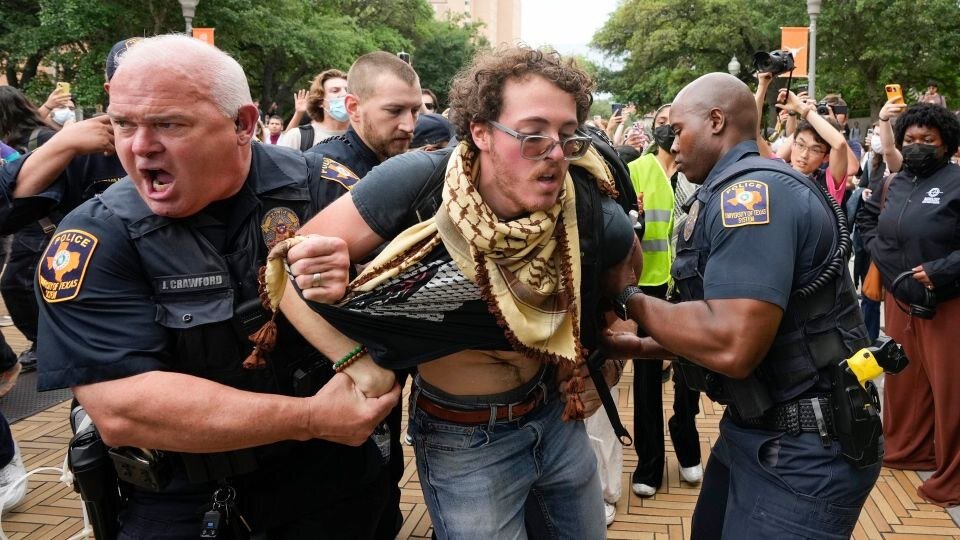'American students have been betrayed'
USC professor condemns universities' decision to call police on students protesting Gaza war

TEHRAN - In recent days, American universities have witnessed a disturbing escalation in the suppression of student activism.
Students who have established encampments to demand a ceasefire in Gaza have faced a barrage of negative consequences, including being disparaged, expelled, suspended, physically assaulted, and arrested. Furthermore, some professors who have attempted to shield students from police violence on campuses have also been subjected to similar treatment.
To gain a deeper understanding of this situation, the Tehran Times reached out to Dr. Jody Armour, a distinguished Professor of Law at the University of Southern California. Below is the transcript of an interview with Dr. Armour:
Q: Politicians and school administrators have been accusing the students protesting for the rights of Palestinians of antisemitism. Do you agree with that notion?
A: Absolutely not. That is an untrue and unjust claim being made against the students. I have been there and talked to the students multiple times. Many of them are Jewish, and there are other students from all sorts of religious backgrounds. I myself am Catholic. There is no correlation between being against the slaughter of children and being anti-Semitic. We should not conflate anti-Zionism with antisemitism. These students are simply against war, and the antisemitism accusations are made as an attempt to crack down on them. I think this will only increase student activism and motivate these students to stand for peace.
“No correlation between being against the slaughter of children and being anti-Semitic.”We spend a lot of time teaching these students to think freely and independently, and then we crack down on them when they put our teachings into practice. There were other lies made as well to justify the repression of the students, such as "people were assaulted" or "critical academic buildings were blocked." Individuals present at the protests can easily refute these fabrications. As a witness, I can attest to the peaceful and respectful conduct of the students throughout the demonstrations.
Q: The university has responded heavy-handedly to students' protests by calling in police and taking additional measures like suspension or expulsion. Are professors also being pressured into silence?
A: As a tenured professor, I am protected from administrative pressure when they don't like something I say. However, I'd say there is a subtle form of pressure that encourages faculty members to align with the administration's stance.
The primary threat we face does not emanate directly from the central administration but rather from their decision to deploy police on campus.
Columbia University’s President initiated the practice of inviting police onto university grounds, which was subsequently adopted by other institutions. Notably, universities such as UCLA have resisted this trend, with their presidents and administrators opting not to summon these forces. Security personnel can never enter university premises without explicit authorization from the president.
This decision constitutes a betrayal not only of faculty members but, more importantly, of the students. Administrators frequently emphasize the university's familial atmosphere and the notion that it is the students' home, yet they employ violent agents to mistreat their own family members. The university purports to be "student-centered." However, when students peacefully protest the unjust killing of civilians, they are met with riot police armed with guns, batons, handcuffs, and pepper spray.
Under such circumstances, can we genuinely claim to be providing these students with an education?
Q: Mainstream media has consistently presented a pro-Israel narrative since the commencement of the Gaza conflict. Similarly, universities across the United States have adopted this stance. Given these circumstances, how have students managed to grasp the reality of the situation in Palestine?
A: Many American universities receive funding from pro-Israel donors who perceive any criticism of Israel as unacceptable. This influences the governance of these institutions. That's really the reality of how our schools are run and we need to acknowledge that.
“We should not conflate anti-Zionism with antisemitism.”But despite being exposed solely to pro-Zionist perspectives within educational institutions, students at American universities have developed independent thinking through social media platforms, particularly TikTok and, to a lesser extent, Twitter. These platforms have enabled younger generations to bypass the official narrative. That's why U.S. officials are now attempting to ban TikTok. They seek to restrict young people's access to alternative sources of information.
Q: As a renowned advocate for racial justice, do you observe any parallels between the ongoing protests on American university campuses and previous movements to uphold the rights of African Americans?
A: Many of the students participating in these pro-Palestine protests were between the ages of 10 and 13 when the Black Lives Matter movement gained momentum. These young individuals witnessed firsthand the importance of challenging authorities in the face of systematic oppression and violence against marginalized groups. During the BLM movement, African Americans were the marginalized group, while in this instance, it is the Palestinians. Once again, protesters seeking justice are met with a harsh police response.
Historically, advocates for racial justice have also endeavored to extend their perjuangan to address war. Martin Luther King publicly spoke of the Vietnam War and advocated for its cessation.
Leave a Comment